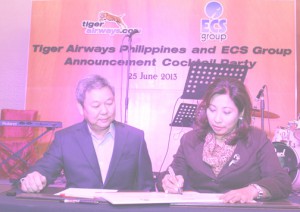
LOW-COST carrier Tiger Airways Philippines expects its air cargo business to contribute about 7% of its P5 billion forecast sales for this year as it targets to grow its share of the domestic aviation market from 3% to 5%.
Tiger president and chief executive officer Olive Ramos told PortCalls in an interview she expects the cargo operation to pick up following its relaunch on June 25 with RAF International Forwarding (Philippines) taking over as sales agent of the service.
Ramos said the sales target is actually three times the airline’s sales last year.
“This target is based on the bullish tourism targets of the Department of Tourism and the increasing number of travelers from wider segments of the society,” she said.
The DOT is eyeing 10 million tourists by 2016.
At the relaunch held in Marriott Hotel at Resorts World, Ramos and Roland Quah, chief operating officer of ECS Asia Pacific, signed an agreement with ECS Group designating the Singapore firm as its general sales and services agent (GSSA) in the Philippines through local partner, RAF.
The deal took effect July 1 and will last three years initially, RAF said.
Ramos said Tiger chose ECS because of the synergies of working with a reputable group in the cargo industry.
“ECS is one of three reputable firms providing GSA services for Tiger in Singapore,” she said, adding that she has known RAF since her days in the logistics business.
“I’ve worked with them and I’m certain our partnership will bring synergies to Tiger’s cargo operations,” said Ramos, who used to head DHL Supply Chain.
Judith Azarcon, president of RAF, told PortCalls in an email that Tiger chose its principal ECS Group because of ECS’ experience and expertise.
“RAF is ECS’s appointed partner for the Philippines due to our management capability, good relationship and excellent reputation for 20 years in the cargo industry,” she added.
Under the deal, “RAF, as ECS’ representative in the Philippines, has the sole right to sell the cargo space of all Tiger Airways flights to both domestic and international destinations,” Azarcon said.
She said financial details of the contract “are strictly confidential”.
Azarcon said it is the first time for RAF to be in the area of airline general services agency, one of its four “major umbrellas of operations” that include international door-to-door courier; international sea and air freight forwarding; domestic courier, forwarding and distribution.
Tiger Airways Philippines, which used to be known as SEAIR until it was allowed to rebrand recently, expects to gain more passenger and cargo traffic as it opens more routes in the coming months amid a strong economy and the government’s drive to attract more tourists, Ramos said.
The airline will begin flying under the Tiger brand on July 10 and open a route from Kalibo, Aklan, to Singapore on July 18 to tap into the tourist market of the prosperous city-state.
Ramos said the company is selling itself as an airline that puts a premium on safety and reliability.
“Tiger Airways is a distinguished regional brand and we want it to attract customers by offering safety and reliability,” Ramos said.
Ramos said Tiger would add more planes only when it gains slots at the Ninoy Aquino International Airport. The airline has its hubs at Clark International Airport, where most of its flights originate, and at NAIA Terminal 4.
The airline has a fleet of five Airbus A320s and an A319. Ramos wants that number to grow to 25 by acquiring at least three to four aircraft a year in the next three to five years, all of them through jet leasing.
Tiger Airways Holdings Ltd., partly owned by Singapore Airlines, acquired a 40% stake in SEAIR last year.





